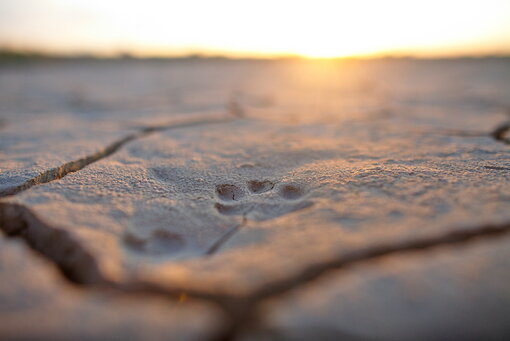nCa Report
The deserts in Central Asia are winter-cold deserts. Of all the winter-cold deserts in the world, 95% are in the Central Asian region. It puts them in a different category from the other deserts of the world. This creates a challenge for the people who are working to preserve the delicate ecosystem of these deserts and figuring out the sustainable ways to benefit from them.
Some institutions and organizations from Germany are in the forefront of this effort. The regional countries, of course, have been attentive to the nature of their deserts and the issues facing them but the pace and quality of work would not have been the same without the great contribution made by the German partners. Central Asia is indebted to them.
In this part of the series, we would like to mention some of the partner institutions and organizations from Germany to acknowledge their ongoing contribution and dedication to the region.
The Michael Succow Foundation
The Michael Succow Foundation was established in 1999 as the first charitable conservation foundation under the Civil Code in the new federal states of Germany. The prize money from the Right Livelihood Award, bestowed upon Prof. Dr. Michael Succow in 1997, was donated as the basis capital for the foundation, which aims to ‘Preserve and Sustain’ the Ecological Balance.
https://www.succow-stiftung.de/en/
The Michael Succow Foundation is an operational foundation on the national and international level. It is engaged in the development and protection of national parks and biosphere reserves in the transformational countries of the former Eastern bloc (Azerbaijan, Turkmenistan, Uzbekistan, Russia).
The foundation is currently overseeing the care of three Nature Conservation Areas in north-eastern Germany, with other areas soon to follow. The goal is the development of wilderness oases, accompanied by special opportunities to visit and experience nature firsthand, which are meant to foster a deeper understanding for the re-transformation of the Central European cultural landscapes into wilderness.
Professor Michael Succow and his deeply committed team are supported by an honorary foundation board and countless active volunteers. The foundation works in close co-operation with the Institute of Botany and Landscape Ecology of the Ernst-Moritz-Arndt University in Greifswald, as well as with many other national and international research facilities, i.e., the National Institute for Deserts, Flora and Fauna in Ashgabat, Turkmenistan.
The Right Livelihood Award honours and supports people solving global problems. It comes with a cash prize of 1 million Swedish crowns ($115,000) and long-term support to highlight and expand Laureates’ work.
International Climate Initiative (IKI)
The IKI is a key element of Germany’s climate financing and the funding commitments in the framework of the Convention on Biological Diversity.
https://www.international-climate-initiative.com/en/about-iki
The Initiative places clear emphasis on climate change mitigation, adaption to the impacts of climate change and the protection of biological diversity. The IKI aims to:
- Promote a climate-friendly economy by supporting partner countries in establishing a climate-friendly economic structure that prevents climate-damaging greenhouse gas emissions;
- Promote measures for climate change adaptation by supporting appropriate national programmes in selected partner countries that are especially vulnerable to climate change;
- Promote and finance measures for preservation and sustainable use of carbon reservoirs/Reducing Emissions from Deforestation and Degradation (REDD).
IKI supports through two main funding pillars: the thematic and the country-specific selection procedures. Both procedures use idea competitions to select innovative projects. This approach ensures that the best ideas and concepts will be implemented and that the diversity of the implementing partners grows. In addition to selecting projects from the ideas competitions, IKI also offers Small and Medium Grants for small-scale projects.
The IKI takes a concerted approach to climate action and biodiversity conservation. It supports projects in four funding areas: (I) mitigating greenhouse gas emissions, (II) adapting to the impacts of climate change, (III) conserving and restoring natural carbon sinks, and (IV) conserving biological diversity.
GIZ – Deutsche Gesellschaft für Internationale Zusammenarbeit (GIZ) GmbH – German Corporation for International Cooperation
The Deutsche Gesellschaft für Internationale Zusammenarbeit (GIZ) GmbH or GIZ in short (English: German Corporation for International Cooperation) is a German development agency headquartered in Bonn and Eschborn.
https://www.giz.de/en/html/index.html
GIZ has its presence in 120 countries in the world, including all of the counties of Central Asia.
University of Greifswald
The University of Greifswald, formerly known as “Ernst-Moritz-Arndt University of Greifswald”, is a public research university located in Greifswald, Germany, in the state of Mecklenburg-Western Pomerania.
Founded in 1456 (teaching existed since 1436[2]), it is one of the oldest universities in Europe, with generations of notable alumni and staff having studied or worked in Greifswald. As the fourth oldest university in present Germany, it was temporarily also the oldest university of the Kingdoms of Sweden (1648–1815) and Prussia (1815–1945), respectively.
https://www.uni-greifswald.de/en/
Approximately two-thirds of the 10,179 students are from outside the state, including international students from 90 countries all over the world.
The primary medium of instruction at the Greifswald Univesity is the German language. However, the university provides seven international degree courses in English: ‘Landscape Ecology and Nature Conservation’, ‘Earth Sciences’, ‘History and Culture of the Baltic Sea Region’, ‘Biodiversity, Ecology & Evolution’, ‘Infection Biology and Immunology’, ‘Bioeconomy’, and ‘Binational Teacher Training Degree Course for German and Polish’.
* * *
Central Asia as a region can find more ways to expand the cooperation with The Michael Succow Foundation and the University of Greifswald. Long-term study tours of the deserts in Central Asia – within or outside the framework of CADI – would be helpful.
Also, it would be highly laudable if the public and private sectors could make regular financial and material contributions to The Michael Succow Foundation. /// nCa, 10 May 2024 (to be continued)
